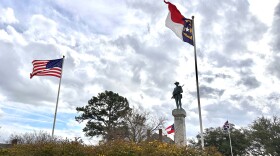Updated 12:05 p.m. | August 22, 2018
The North Carolina historical commission has agreed to keep three Confederate monuments on Capitol grounds.
The commission determined that their hands are tied by a General Assembly's 2015 law and that if the people want the monuments removed, their only recourse is to change the law.
But they acknowledged the over-representation of confederate monuments at the state Capitol and that there should be context added to those. They also said at least one monument should be added to reflect the contributions of African-Americans to the history of North Carolina.
The decisions comes less less than two days after protesters at the University of North Carolina's flagship campus toppled a statue of a Confederate soldier, a committee plans to announce its recommendation for three other 20th-century monuments on the state Capitol grounds.
Gov. Roy Cooper, a Democrat, asked last year that they be moved to a Civil War battlefield to ensure their preservation.
While Cooper's request last September didn't say why he thought the three monuments were in danger, his request did follow two events: a violent white nationalist rally over a Confederate statue in Charlottesville, Virginia, and the toppling of a Confederate statue outside a Durham County government building by demonstrators.
The commission's vote comes about 36 hours after a statue known as "Silent Sam" was toppled on UNC's Chapel Hill campus Monday night. The bronze figure of an anonymous soldier was pulled down from its stone pedestal by protesters who used banners to mask their action.
The statue, erected by the United Daughters of the Confederacy in 1913, had been under constant, costly police surveillance after being vandalized in recent months. Many students, faculty and alumni argued that "Silent Sam" symbolized racism and asked officials to take it down.
Late last year, Cooper asked the commission to move the monuments on the state Capitol grounds to the Bentonville Battlefield State Historic Site located in Four Oaks, about 45 miles (72 kilometers) away from the Capitol.
The state attorney general's office wrote in May that the commission can order that the monuments be moved, provided the move meets several criteria, including that relocation is necessary to preserve them.
As far as prominence, a letter from the state historic preservation officer shows that the Bentonville Battlefield attracts about half the visitors that the state Capitol grounds do, with the exception of the Civil War's 150th anniversary year of 2014-2015. That year, almost 113,000 visitors came to the battlefield and almost 106,000 to the Capitol grounds.
In 2016-2017, the battlefield attracted 47,000 visitors while almost 104,000 went to the Capitol grounds, according to the letter from Kevin Cherry, the state historic preservation officer and deputy secretary of the state Department of Natural and Cultural Resources.
Each of three monuments on the Capitol grounds was erected decades after the end of the Civil War, as was Silent Sam: the Capitol Confederate Monument, dedicated in May 1895; the Henry Lawson Wyatt Monument, dedicated in June 1912; and the North Carolina Confederacy Monument, dedicated in June 1914. Silent Sam was erected in 1913.












